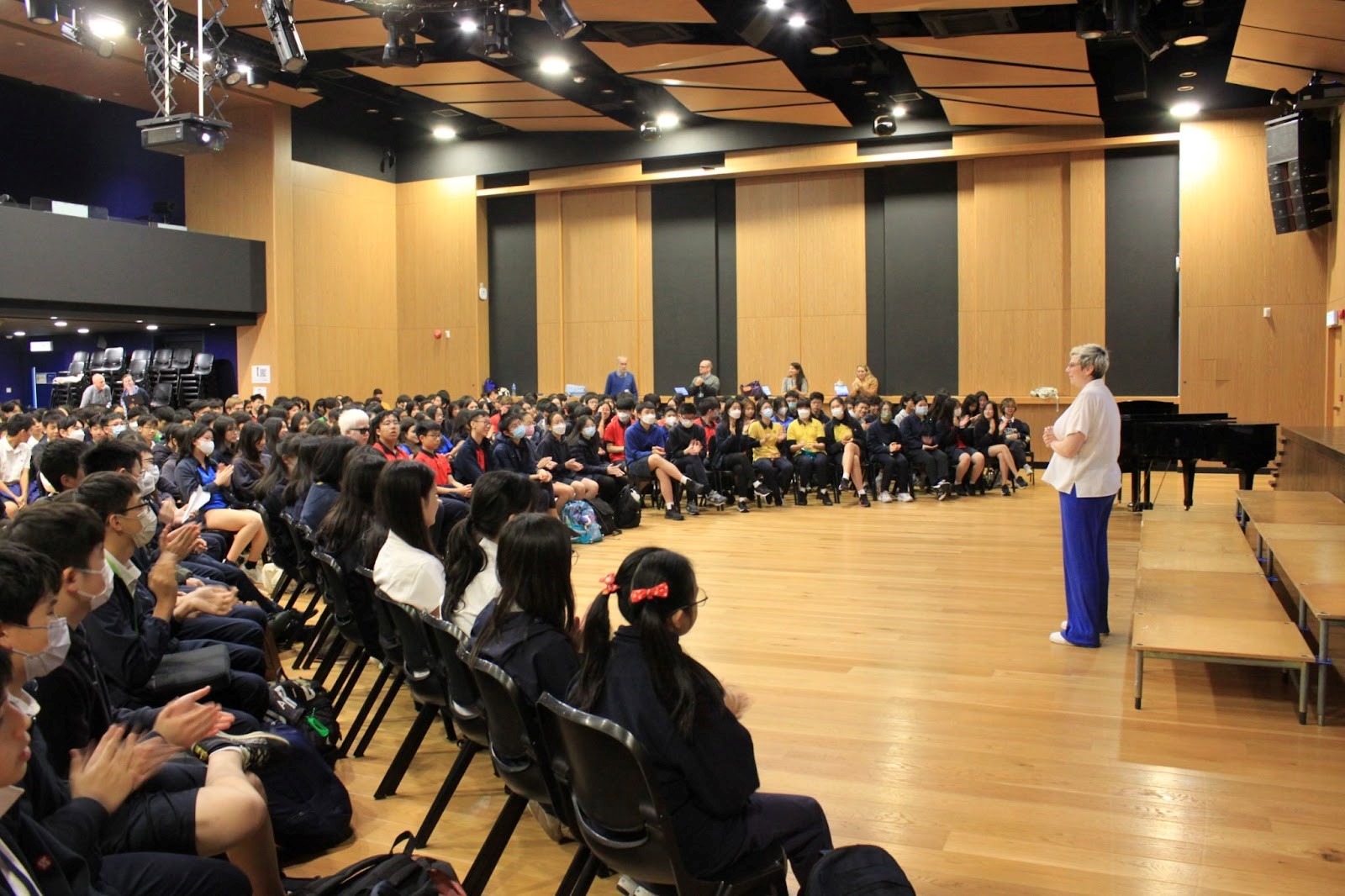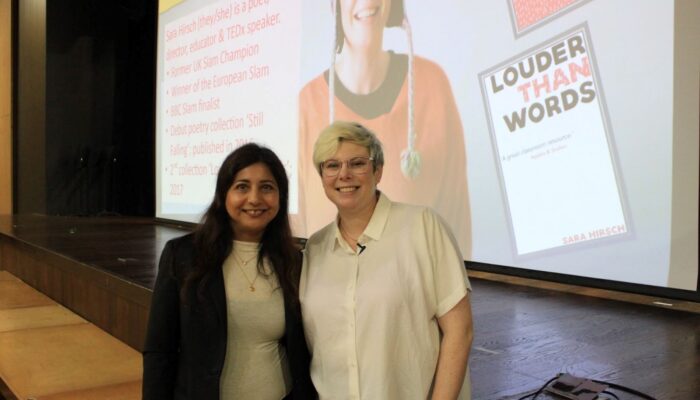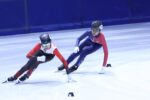Sara Hirsch on Writer’s Block, Their Creative Process, and What Makes a Great Poem
Hi Sara! For those who may be unfamiliar with your work, can you please tell us a bit about yourself?
I’m a poet and a performer, so I make poems about all sorts of things, and I go and perform those poems in all sorts of places around the world. Sometimes I also work in schools and lead workshops, sometimes I write books, and sometimes I make theater shows. I do all sorts of creative, word-y things.
This week is Book Week! So to start us off, what are you currently reading, or do you have any book recommendations?
I’m currently reading a book called Tomorrow, and Tomorrow, and Tomorrow which is really good, I recommend that. I also really like The Bone Season by Samantha Shannon. Of course, I recommend everyone pick up a poetry book during Book Week. At the moment I’m also reading non-fiction books, I get a lot of inspiration from non-fiction books.
You’ve just spent a day at Sha Tin College, giving presentations and workshops. What has your experience been like so far?
It’s been great! I’ve had a fun day. I did a big performance with Year 9 and 10, which was awesome; there were 500 people, so it was a big crowd. That was fun and interactive, and I got lots of really good questions in the Q&A. And then I’ve done some workshops, and each group has been really different, which is what I’ve enjoyed. Each group has come up with something that’s been really surprising, imaginative, and creative.

What inspired you to pursue poetry instead, considering you went to a drama school and studied to be an actor at university?
Actually, what I do is really similar to what I trained to do, so I use lots of the skills that I learned when I was studying acting. I use them all the time, not just in my performance, but we also learned things about improvisation, comedy, and drama that I put into my writing as well. With poetry you get to create your own work that you get up and perform, so I got really inspired to do that while I was training at drama school. And then I took that and ran with it after drama school! I still use all the same skills but this way I get to bring my writing in as well.
What is your favorite part of being a poet and an educator?
My favorite part is that everyday looks really different, and that I get to be creative with not just the work that I make, but also how my life looks. I get to decide what I’m going to do each day, whether that’s come and do workshops in schools, write a new poem, or collaborate with someone on a project. It means my life is always filled with surprises and no two days are the same.
On the other hand, what are some obstacles you face in your work?
I think the biggest obstacle would be writer’s block; that’s something most writers will experience at some point where you can suddenly have no ideas. And you’ve got to make new work, because people are expecting you to. I’ve got a few ways of dealing with it. I’ll stop writing and go do something else for a bit, because maybe I’m not feeling inspired because I haven’t read a book, watched a play, or just been outside for a while. The other thing I do if I have writer’s block is I do the opposite. I write as much as I can, and I write badly until something good comes along. I force myself to write. So my biggest obstacle would be writer’s block, but there’s also other things that make this job quite hard. For example, other people need to believe in me in order for me to get work, because to be a poet is not like a normal job. It’s self-employed, so I need to make sure I’m meeting the right people, so that they give me work and I can keep going!
Do you have a favorite poem out of the many you have written? Why is it your favorite?
My favorite poem out of all the ones I’ve written is a poem about my name that I always start with. The reason it’s my favorite is because it’s one of the most fun to perform. It’s really rhyme-y, it’s quite silly, and it makes people laugh. It’s also really relatable – whenever I perform there’s always people in the room who come up to me afterwards and say, “That’s happened to me, that’s exactly my experience!”. That means I’ve managed to make connections with people that I’ve never met before through my poetry, which is the whole point of doing what I do for me.
In your TED Talk, you speak about how you used poetry as a way to articulate difficult emotions, such as grief. Is this still true? What does poetry mean to you now?
Everything I say in my TED Talk is still very true for me, but I think in the years since, poetry has changed a bit for me. It’s definitely a way of processing emotions, such as grief, but it’s also a way for me to connect and create empathy with people that I’ve never met before. That’s something I’ve discovered even more, especially through the last few years and COVID. You can feel like you’re really alone, or the only person going through an experience, but then you put a poem out about it, and someone goes, “Oh, I’ve experienced that too!”. I’d have never known that if I hadn’t written this poem.
What does your creative process look like? How long does it take to go from an idea to a full, polished piece?
It varies – my creative process can be all over the place. Sometimes a poem just lands in my lap, and it goes from being in my head to being on the page, perfectly finished, within about half an hour. But that’s really rare. Even if a poem does that and it seems like I write it really quickly and it comes out all in one go, it’s been writing itself in my head for weeks. But normally I would say my poems start as little scribbles and ‘word doodles’. I’ll sit down with that word doodle, and I’ll let it linger around in my head. Then I’ll come back to it, write a little bit more, go away, come back and maybe I’ll add a different idea in. It slowly builds, and poems can take days, weeks, months, and sometimes, even years. I’ve got poems in my notebooks that I’ve been carrying around for years, and I’ll eventually find exactly the right way to frame them.
Are there any specific poets or writers you admire or who have influenced your work?
The first big inspiration for me was a poet called Kae Tempest, who is fantastic, and that was definitely a really early inspiration, in terms of rhyming and performance poetry. I also really like Michael Rosen, who does funny, silly, word-y poetry that’s often for kids, but not just for kids. I also like Carol Ann Duffy, who was the UK poet laureate. So lots of writers, and not just poets, but fiction writers and playwrights too. Sometimes Shakespeare is a big inspiration.
As an educator, what are some problems you see in the current school system and curriculum?
I think the way that poetry is taught in schools does not necessarily take into account the full range of poetry that is out there. Sometimes, it can feel like a test, whether you understand it or not, and that’s a measure of how someone interacts with poetry. As a poet, I don’t actually mind if you don’t understand every single word and technique that’s in my poems. I care about whether you feel something, and that’s lacking a little bit in the way that poetry is taught, because of the curriculum. Some teachers feel like they have to teach poetry like that, or think it’s the only way. There’s lots of other ways you can understand poetry, and often it comes down to, “how does it make you feel?”.
Finally, what do you think makes a great poem? Do you have any advice for aspiring writers?
I think a great poem is one that someone else can read or hear and then find something in it that they relate to. If you put a specific image, reference, or description into your poem, someone else is going to be able to see that image, understand it, and relate to it. Whereas if it’s really vague, it’s actually harder to relate to it, because anybody can have written that. If you’re the only person who could’ve written something, then weirdly it becomes more relatable. So my advice is, the more specific you can be in your poetry, the better.
Written by Kathy Fan and Jobie Leung
Edited by Shannon Tan




